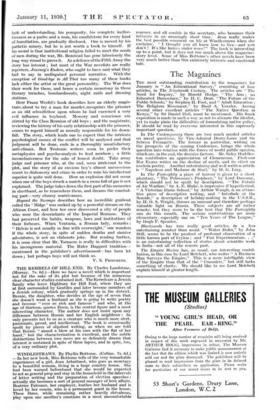The Magazines
THE most outstanding contribution to the magazines for January is " An Educational Survey," consisting of four articles, in The .Nineteenth Century. The articles are " The Need for Inquiry," by Harold Hodge, " The Aim ; an Educated Democracy," by H. C. Dent, "The Future of the Public Schools," by Stephen H. Foot, and " Adult Education ; The Religious Movement," by Basil A. Yeaxlee. Among several other excellent articles " The Native Question in Kenya," by Sir Daniel Hall, must be mentioned. His frank exposition is made in such a way as not to alienate the idealist, yet to make plain the difficulties of formulating native policy. It should be read by everyone interested in this supremely important question.
In The Contemporary there are two much needed articles on naval questions, by Vice-Admiral Drury-Lowe and Sir Selwyn Fremantle. The former in particular, writing on the prospects of the coming Conference, brings the whole question into relation with the forces of world public opinion, which are, in the end, the decisive factors. Mr. Sisley Huddles- ton contributes an appreciation of Clemenceau. Professor Ifor Evans writes on the decline of myth, and its effect on modern poetry. Another entertaining and well written article is Napoleon and Madame de Stabl," by D. G. Larg.
In The Fortnightly a place of honour is given to a short phantasy, " The Policeman's Prophecy," by Lord Dunsany, which should not be spoilt by description. " The Future of Air Warfare," by A. E. Blake, is impressive if hypothetical. " A Victorian Dame School," by Arthur Waugh, is an attrac- tive piece of descriptive writing, and " Interlude at the Seaside," a description of holiday-making in the U.S.S.R., by H. 0. S. Wright, throws an unusual and therefore perhaps valuable light on Russia. These subjects are all rather remote, but they seem to be the best that The Fortnightly can do this month. The serious contributions are more elementary, especially one on " Ten Years of The League," by Hugh F. Spender.
Blackwoods has two really good articles, in a less entertaining number than usual. " Water Holes," by John Still, seems to be the product of profound observation of a little known part of Ceylon ; and " Fiat Experimentum. . ." is an entertaining collection of stories about scientific work in India—not all of the remote past.
The Empire Review has, as usual, one interesting contd. bution, in this case by Lord Melchett, who writes " A Business Man Surveys the Empire," This is a more intelligible view of the Empire than that of the " Crusaders," but still lacks something of clarity.' We should like to see Lord Melchett explain himself at greater length.






































 Previous page
Previous page